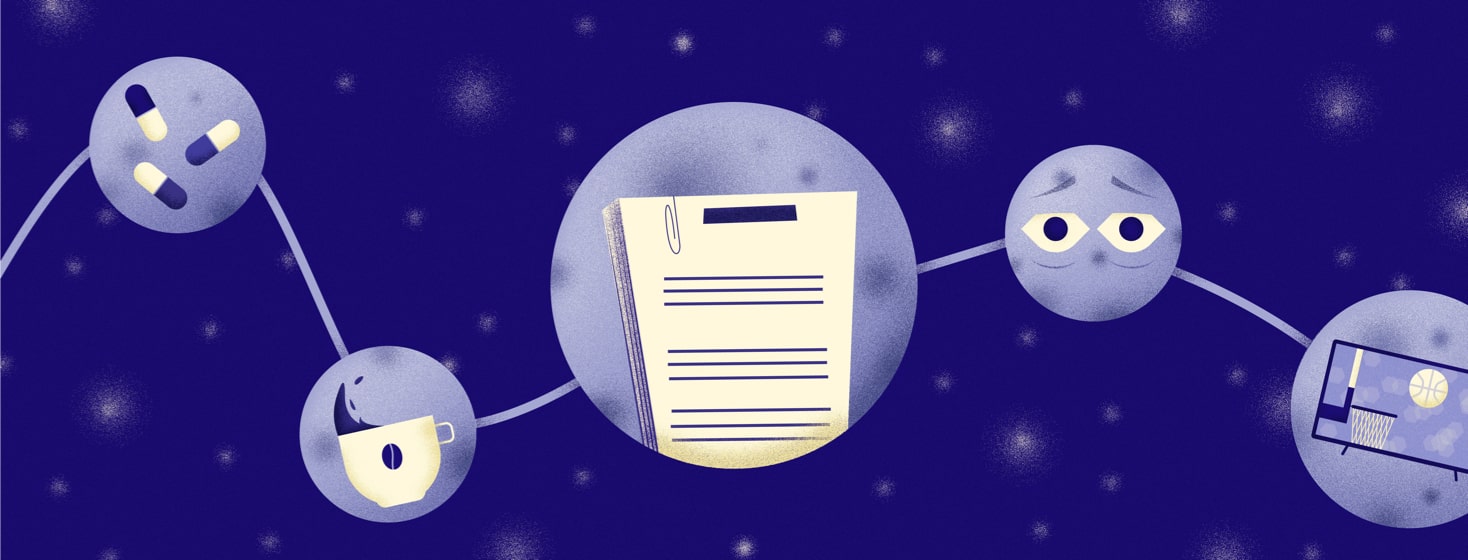Don’t Forget to Keep a Sleep Diary Before Your Sleep Study
If you’re in the process of preparing for an upcoming sleep study, you may have received a raft of paperwork to fill out beforehand, most of which you’ll return at your appointment or at some point ahead of time.
What is a sleep study diary?
Among those items, you’re likely to discover a sleep diary. What’s a sleep diary, exactly? And why is it so important to complete before a sleep study?
Sleep diary basics
There are 2 kinds of sleep diaries.
Some folks will buy a commercial 1 to use independently to track their sleep as well as their dreams; these look like bound journals with a year’s worth of days and nights to track.
However, a sleep diary given to you by a medical professional more likely resembles a form that covers a limited period, typically 2 weeks. It probably won’t be bound like a book, but presented more like a worksheet that you fill in during the days prior to your study.
In the medical sleep diary, you’ll be asked a number of questions about your nightly sleep patterns. (For people who work overnight shift, their diary will focus on their daily sleep patterns.)
Tips for filling out a sleep diary
Try to fill in each day in the diary, if possible, for the most effective results. One way to be certain you don’t forget — keep the form with a pencil next to your bed. Be honest, and if you don’t know an answer, try an educated guess.
These forms are usually pretty straightforward, asking questions you should be able to answer, such as “bedtimes” and “rise times.” There’s no need to be exact. A best estimate will do.
Record unusual things too
You may also be asked about unusual things that happen during the days and nights leading up to your study, such as illness, an emergency, the death of a pet, or the loss of a job.
It’s important to note anything that happens out of the ordinary. The events of your conscious day that vary from the norm — even positive events, such as attending your daughter’s wedding, for example, will have some impact on your sleep.
Your diary will include spaces for notes on other things like:
- Activities right before bedtime
- Medications taken
- Alcohol intake in the hours before bed
- Your consumption of caffeine (times, amounts)
- Naps (time of day and length)
- Any awakenings during the night for any reason
- Symptoms from other health conditions, such as arthritis, which might impact sleep quality
Share your own insights
You’ll also be given an opportunity to share your own insights into your sleep quality. While your opinion about the quality of your sleep may be subjective, research shows that such insights can be very useful for the doctor trying to make a diagnosis.
So, if you consider your sleep quality very good — or not great at all — both answers are acceptable as long as you’re being honest.
Finally, if you have anything else you want to add that might be relevant to your sleep, such comments will also be encouraged. For instance, if you note that your sibling recently revealed they were diagnosed with a sleep disorder, you could share that information, as these conditions often run in families.
The importance of filling out a sleep diary
When I worked in the sleep lab, I often cared for patients who didn’t fill out any of their paperwork. Or, sometimes they filled out the insurance and other administrative paperwork, but skipped the sleep diary.
It can be easy to miss, and I wish sleep clinics would make it far more prominent in their patient packets. Why? Because the data captured in a patient’s sleep diary goes a long way toward informing the sleep doctor when it comes to deciding on a diagnosis.
Without this information, it can be hard to identify easy-to-fix causes for inadequate sleep (such as poor sleep hygiene). It can also mean that key factors, like medications or chronic illness, might be at the root of your sleeping problem. But without this information on hand, your doctor might miss this link.
Your data helps your diagnosis
Ultimately, the inclusion of a complete sleep diary enhances the validity of your entire sleep study, providing concrete details about sleep habits that might not be observed accurately in a lab environment.
After all, many people don’t have a normal sleep period during an overnight study in the clinic. A completed pre-study sleep diary can provide a necessary, reliable snapshot of accurate data and insights for the doctor reviewing your test results.
And this is what you’re having a sleep study for, in the first place, right? To uncover reasons for poor sleep? As the saying goes, knowledge is power. Don’t forget to fill out your sleep diary – you’ll be better for it.
Did you complete a sleep study diary? Please share a comment below.

Join the conversation